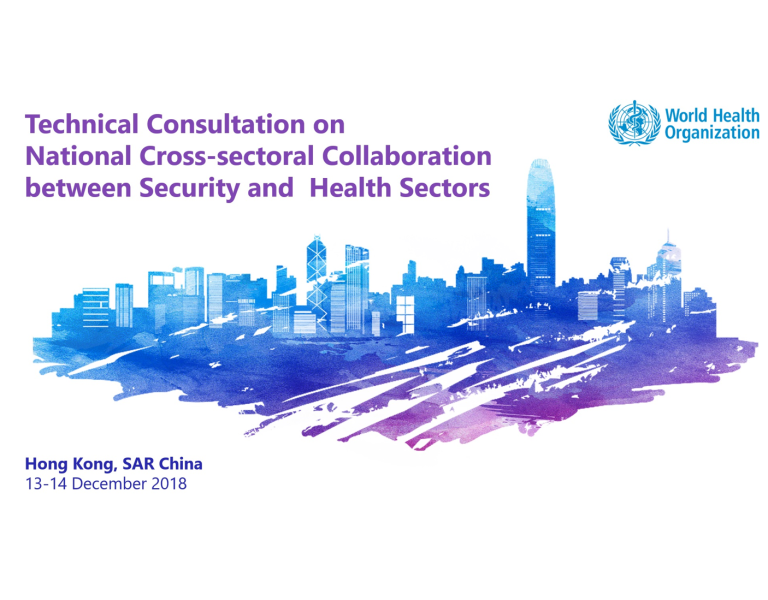
Technical Consultation on National Cross-Sectoral Collaboration Between Security and Health Sectors
December 13, 2018
The International Health Regulations (IHR (2005)) require 196 States Parties to the IHR to detect, assess, report, and respond to potential public health emergencies of international concern (PHEIC) in a timely manner at all levels of government. Improving collaboration between the health and security sectors has been identified as one area with the potential to unlock substantial gains in national capacity to prevent, detect and respond to public health emergencies, which is in line with the WHO Health Security Interface, which supports activities that involve both the health and security sectors. The value of greater collaboration between these two sectors has been underlined by informal collaborations usually formed during crises. For example, the Ebola outbreak in West Africa provided a catalyst for many regional actors to explore ways of strengthening cross-sectoral collaboration between the security and civilian health sector. Critically is, however, to ensure effective collaboration in the long-term and to identify pathways for collaboration before and outside of an emergency context.
In October 2017, the Indonesian Government as Chair of the International Committee of Security Medicine hosted the meeting “Managing Future Global Health Risk by Strengthening Civilian and Security Health Services” in Jakarta, Indonesia. The meeting brought together over 160 public health and security representatives from 44 countries, International Organizations, partners and donors to agree on shared guiding principles on how to strengthen collaboration between security and civilian health sectors at the national, regional, and global levels, in line with G20 commitments to strengthen global health security and accelerate the implementation of the IHR (2005).
The following guiding principles and recommendations for next steps were agreed upon in the Jakarta Meeting:
- A national framework for collaboration between security and civilian health services is necessary for effective health security governance. Countries should develop a national framework for collaboration based on the common goal of global health security, and in line with the principles set forth in the International Health Regulations (IHR 2005). Countries should also consider reviewing existing policies and SoPs between the security and public health to enable optimal collaboration before, during, and after public health emergencies;
- National stakeholders should be enabled to effectively manage public health risks and events that may constitute a public health emergency at national level that could impact the regional and become international concern of the IHR (2005). Capacity building measures include areas such as disease surveillance, reporting, preparedness, biosafety and biosecurity, and response between civilian and, where appropriate, security sectors;
- Cooperation across human health, animal health, and environmental health and security sectors is needed to ensure countries are able to effectively detect, prevent, and respond to public health risks at the interface between humans, animals, and ecosystems. Countries should take a holistic approach in developing their national action plans for health security (NAPHS) and in strengthening strategic partnerships. In leveraging the current momentum that recognizes the untapped potential in security to civilian health collaboration, the WHO Strategic Partnership for IHR (2005) and Health Security team in consultation with WHO Health Security Interface plans to conduct a two-day technical consultation for in order to move this strategic development forward.
Objectives:
- To enhance countries’ capabilities and IHR capacities to prevent, detect and respond to potential pandemics;
- To facilitate sharing experiences between countries to identify best practices of security and civilian health collaboration including the form of institutionalization/formalization of these collaborations;
- To develop framework for security and civilian health collaboration that focuses on (a) key considerations, b) key technical areas, and c) collaborative frameworks at the national level;
- To explore how WHO and partners can support the development (institutionalization/formalization) implementation of a collaborative framework of security to civilian health collaboration at the national level.